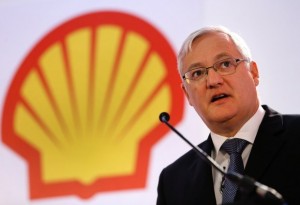London – Royal Dutch Shell chief executive Peter Voser is to call on the global energy industry to continue investing heavily in costly new production projects to avoid a return to the days of record high oil prices weighing on global growth.
”Supplying the world’s energy needs will be extremely tough,” Mr Voser will say in a speech in London. ”Our first priority must be to invest heavily in new supplies, and to maintain it through economic and political turbulence. Failing to do so would be a sure path to another crunch and major price volatility.”
Mr Voser’s comments come amid concern a pullback in investment by some resource and energy companies after the global financial crisis could result in supply shortfalls if economic activity should pick up quicker than previously expected.
Oil prices peaked at $US147 a barrel in 2008 amid concerns over the world hitting peak production and Iran shutting off supplies from the Persian Gulf.
”The cornerstone of this investment must be a sound balance sheet,” Mr Voser will tell industry delegates attending the annual Oil & Money conference in London. ”One strong enough to withstand volatile energy prices and revenues, and flexible enough to underpin billions of dollars of investment in new energy sources.”
Demand for energy will double over the next 50 years, Mr Voser will say, spurred by rapid industrialisation in China and across Asia. At the same time, world energy supply is struggling to keep up with prospective demand. The International Energy Agency forecasts crude oil output from wells producing in 2011 will have dropped by almost two-thirds by 2035.
”The coming decades will see a historic change in human society and the global economy,” Mr Voser will say. ”Billions of people are emerging from poverty in China, India and other emerging economies. They’re buying fridges, cars and washing machines, and all the consumer goods we take for granted in the West.”
Analysts have complained that earnings at Europe’s biggest oil companies such as Shell and Italy’s Eni have failed to keep pace with oil prices consistently above $100 a barrel. Citigroup warned in August that higher costs in the upstream production business and the capital intensity of big production projects had eroded profitability
In his speech, Mr Voser will defend Shell’s commitment to a number of high-risk energy projects such as the Sakhalin-2 liquefied natural gas scheme in Russia and a $19 billion gas-to-liquids project in Qatar.
Telegraph, London



